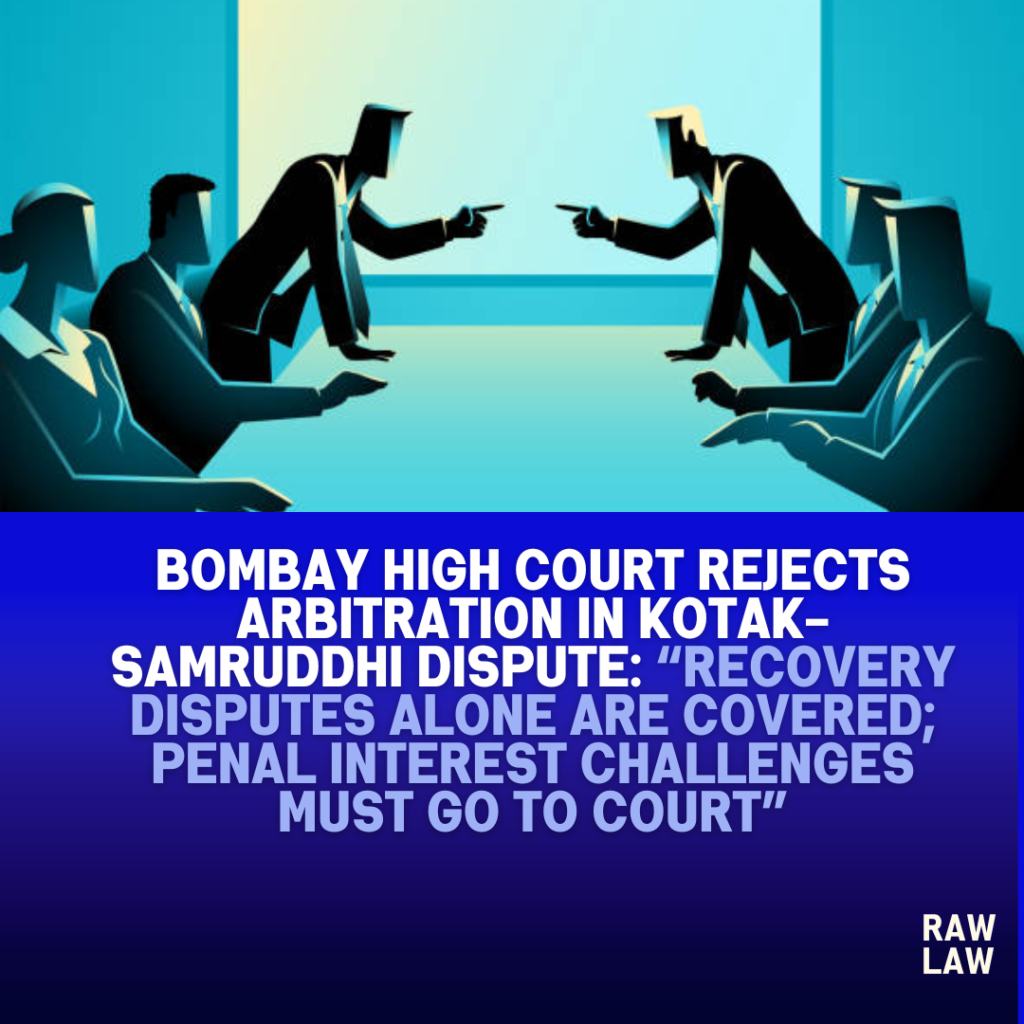Name of the Judgment:
Samruddhi Industries Ltd. Through Its Authorised Signatory v. Kotak Mahindra Bank Ltd.
Court’s Decision:
The Bombay High Court dismissed an application under Section 11 of the Arbitration and Conciliation Act, 1996, filed by Samruddhi Industries Ltd. seeking the appointment of an arbitrator to adjudicate a dispute with Kotak Mahindra Bank over alleged abusive penal interest charges. Justice Somasekhar Sundaresan held that the arbitration clause in the Master Facility Agreement was applicable only to recovery claims by the bank below ₹20 lakhs and not to disputes initiated by the borrower. The Court ruled, “The fallback of arbitration contained in Clause 11.7 of the Agreement is not applicable to such a dispute.”
Facts:
The applicant, Samruddhi Industries Ltd., had entered into a Master Facility Agreement with Kotak Mahindra Bank on 18 December 2018. Disputes arose when the bank allegedly charged exorbitant penal interest—36% per annum for delayed execution of security documents and an additional 3% per annum for non-renewal of the loan. The applicant also challenged the blocking of its bank account between 22–25 February 2022. Claiming the dispute fell within the purview of the arbitration clause, the applicant invoked arbitration on 13 May 2024.
Issues:
- Whether Clause 11.7 of the Master Facility Agreement constituted a valid and enforceable arbitration agreement in respect of the current dispute.
- Whether a dispute initiated by a borrower involving penal interest charges was covered by the arbitration clause which mentions DRT pecuniary limits.
Petitioner’s Arguments:
The applicant argued that the penal interest charged was excessive and contrary to the terms of the agreement, and therefore arbitrable under Clause 11.7. They submitted that the clause provided for arbitration as a dispute resolution mechanism and invoked it through a notice dated 13 May 2024.
Respondent’s Arguments:
The respondent bank contended that the arbitration clause was applicable only in cases where the dispute value was below ₹20 lakhs, i.e., within the pecuniary jurisdiction of the Debt Recovery Tribunal (DRT). Since the applicant’s claims exceeded ₹1 crore, the bank argued that the arbitration clause could not be invoked. The bank further asserted that Clause 11.7 applied only to bank-initiated recovery actions and not disputes raised by borrowers.
Analysis of the Law:
The Court examined the scope of Clause 11.7, which explicitly linked arbitration to disputes falling below the DRT’s pecuniary jurisdiction. Justice Sundaresan emphasized that the DRT’s jurisdiction under Section 17(1) of the RDB Act was limited to applications by banks and financial institutions to recover debts. Hence, the clause could only apply to bank-initiated recoveries and not to challenges made by borrowers. The Court observed:
“Since the genus of the dispute necessary for the arbitration agreement to exist is a dispute that would otherwise be amenable to the substantive jurisdiction of the DRT, the threshold of pecuniary jurisdiction is a secondary feature.”
Precedent Analysis:
The Court referred to:
- Tata Capital vs. Vijay Devij Aiya, 2025 SCC OnLine Bom 1357 – where it was held that asymmetrical arbitration clauses, though heavily one-sided, may still be enforceable depending on the intention of the parties.
- Tata Capital Housing Finance Ltd. v. Shri Chand Construction and Apartment Pvt. Ltd., 2022 (1) ARB LR 213 (Delhi) – where the Delhi High Court analyzed the unilateral invocation of arbitration and the issue of mutuality in such clauses.
These cases were used to contextualize the asymmetrical nature of Clause 11.7 and to distinguish the scope of arbitration based on who invokes it and for what kind of dispute.
Court’s Reasoning:
The Court held that the arbitration clause was intended only for small-value recovery claims initiated by the bank, and that borrower-initiated claims regarding abusive penal interest rates were beyond its scope. The asymmetrical design of the clause allowed the bank unilateral powers of appointment and venue selection. The clause’s heading “Jurisdiction and Arbitration” was ruled irrelevant under Clause 1.2.4 of the agreement, which said headings would not affect interpretation. Ultimately, the Court concluded:
“Such a dispute is not amenable to the jurisdiction of the DRT, and therefore, the fallback of arbitration contained in Clause 11.7…is not applicable.”
Conclusion:
The application for appointment of an arbitrator was rejected. The Court granted the applicant liberty to pursue appropriate remedies in competent courts. No costs were awarded due to the arguable legal question raised. The Court further directed that the time spent in these proceedings shall not be counted in the limitation period for any future litigation.
Implications:
This judgment clarifies the scope and limitations of arbitration clauses embedded in financial agreements. It warns borrowers and lenders alike to pay attention to asymmetrical clauses and the substantive jurisdiction of forums like DRT when drafting arbitration agreements. The ruling reinforces that arbitration cannot be invoked merely based on broad contractual language when the agreement restricts its application to particular categories of disputes.
Cases Referred and Their Role:
- Tata Capital vs. Vijay Devij Aiya, 2025 SCC OnLine Bom 1357 – emphasized that asymmetrical arbitration clauses are not per se void, but their enforceability depends on the type of dispute and parties’ intent.
- Tata Capital Housing Finance Ltd. v. Shri Chand Construction, 2022 (1) ARB LR 213 (Delhi) – discussed how arbitration clauses may be misused tactically by stronger parties, and stressed careful scrutiny by courts.
